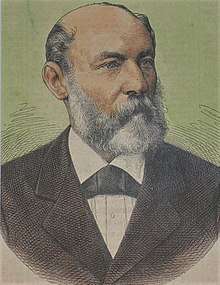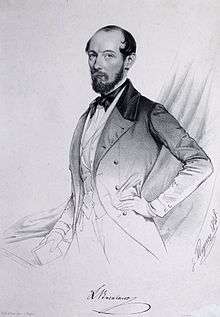Lorenzo Brentano
Lorenzo Brentano (November 4, 1813 – September 18, 1891) was a German American revolutionary, journalist, and later a U.S. Representative from Illinois.
Lorenzo Brentano | |
|---|---|
 Brentano in 1878 | |
| Member of the U.S. House of Representatives from Illinois's 3rd district | |
| In office March 4, 1877 – March 3, 1879 | |
| Preceded by | John V. Le Moyne |
| Succeeded by | Hiram Barber, Jr. |
| President of the Free State of Baden | |
| In office 1849–1849 | |
| Preceded by | office created |
| Succeeded by | Ludwik Mierosławski |
| Personal details | |
| Born | November 4, 1813 Mannheim, Grand Duchy of Baden, Germany |
| Died | September 18, 1891 (aged 77) Chicago, Illinois |
| Political party | Republican |
| Children | Theodore |
| Signature |  |
Biography

Born as Lorenz Peter Carl Brentano in Mannheim, Grand Duchy of Baden, Germany, Brentano received a thorough classical training and studied jurisprudence at the Universities of Heidelberg and Freiburg. He practiced before the supreme court of Baden.
Brentano was elected to the Chamber of Deputies and in 1848 to the Frankfurt Parliament. He served as president of the provisional republic of Baden established by the revolutionists in 1849. He was sentenced to imprisonment for life after the failure of the revolution, but sought refuge in the United States via Switzerland.
He established Der Leuchtturm, a German anti-slavery journal, in Pottsville, Pennsylvania. He settled in Kalamazoo County, Michigan, and engaged in agricultural pursuits. He moved to Chicago, Illinois, in 1859. He was admitted to the bar in 1859 and commenced practice in Chicago. He became editor-in-chief and principal proprietor of the Illinois Staats-Zeitung from 1862 to 1867. The paper was sold in 1867, and Hermann Raster took over Brentano's position as editor. He served as member of the Illinois House of Representatives in 1862, as a member of the Chicago Board of Education 1862–1868, and as a delegate to the 1864 Republican National Convention. In 1868 he was presidential elector on the Grant and Colfax ticket.[1]
In 1869, a general amnesty having been granted to the revolutionists of 1849, he revisited his native land. He was appointed United States consul at Dresden in 1872 and served until April 1876.[1] Brentano's son Theodore would become the first American ambassador to Hungary.
Brentano was elected as a Republican to the Forty-fifth Congress (March 4, 1877 – March 3, 1879). He was an unsuccessful candidate for renomination in 1878. After leaving Congress, he engaged in literary and historical research designed to compare and contrast the American and European codes of criminal procedure. In this line of work he published a report of the trial of the assassin of President Garfield, and a history of the celebrated case of Kring v. Missouri (see List of United States Supreme Court cases, volume 107).[1] He died in Chicago, and was interred in Graceland Cemetery.
Notes
References
| Wikimedia Commons has media related to Lorenz Brentano. |
- United States Congress. "Lorenzo Brentano (id: B000804)". Biographical Directory of the United States Congress.
- Wilson, J. G.; Fiske, J., eds. (1900). . Appletons' Cyclopædia of American Biography. New York: D. Appleton.
- Gilman, D. C.; Peck, H. T.; Colby, F. M., eds. (1905). . New International Encyclopedia (1st ed.). New York: Dodd, Mead.

| U.S. House of Representatives | ||
|---|---|---|
| Preceded by John V. Le Moyne |
Member of the U.S. House of Representatives from Illinois's 3rd congressional district 1877-1879 |
Succeeded by Hiram Barber, Jr. |
| Preceded by George Schneider |
Editor in Chief of the Illinois Staats-Zeitung 1861-1867 |
Succeeded by Hermann Raster |